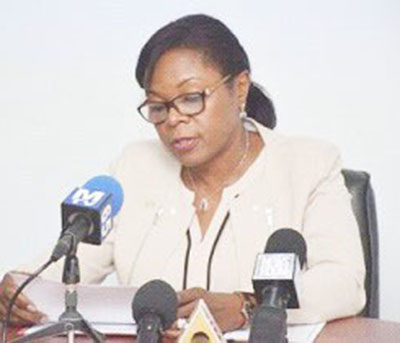Deputy Chief Medical Officer Dr Karen Gordon-Boyle yesterday said that rapid tests could be useful for screening purposes for the novel coronavirus disease (COVID-19) but maintained that Polymerase Chain Reaction (PCR) testing remains the standard for confirmation of cases.
According to Gordon-Boyle, the testing being done in Guyana for the virus can pick up a positive case between 24 to 48 hours before someone becomes symptomatic. She said that even though you may have persons who don’t show symptoms of the virus testing positive, the ministry would not be able to go out and test everyone. “But then you may have a lot more people, if you just go testing people that will be negative and remain negative. So it’s not the kind of test, because of its expense, that we’re going to get to do tests on everyone,” she explained to Stabroek News during an interview.
She further said the ministry is currently considering a number of options to increase testing, while plans are in train to order more testing kits and reagents. “The way we’ve been doing the testing—which is testing persons who meet the case definition of a suspected case—we are doing well in terms of the supplies of the testing kits. If we were to slacken and test anybody that wants to get tested, we would have problems,” she, however, noted.
Last Saturday, Chairman of the National COVID-19 Task Force (NCTF), de facto Prime Minister Moses Nagamootoo, revealed that the government has granted permission to private health facilities to import their own testing kits as he noted that the government “cannot be a monopoly” in relation to testing for the virus.
Polymerase Chain Reaction (PCR) testing, which requires nasopharyngeal or oropharyngeal samples, is the current testing method being used in the country.
Gordon-Boyle explained that while rapid testing looks at antibodies and results can be presented within an hour, the PCR testing looks for the actual viral particles and results can take five hours or more.
“When the virus enters the body, the body usually creates something to fight it (antibodies), so the antibody test looks for the body’s reaction to having a virus inside it. So a test that can pick up the virus first would be a more sensitive test because it can pick up those particles before it can pick up the antibodies,” Gordon-Boyle said.
She added that so far none of the rapid tests that have been developed have been approved by the World Health Organization (WHO).
Gordon-Boyle noted that it is for that reason that the ministry is not endorsing those tests to confirm positive cases. She went on to say PCR testing is a more sensitive and accurate method of testing and though it may be a bit expensive, that is the method that the ministry would recommend for the private institutions that will be on board with testing for the virus. She noted that if rapid testing is used, there may be some scope for the tests to be used as a screening tool but it would have to be backed up by the PCR testing. The “gold standard,” she said, is the PCR testing and that is the reason that the authorities are not “slackening” to encourage the use of rapid tests. “If someone does use them, you would still have to back it up with the PCR” she said.
Meanwhile, during an edition of the National Communications Network (NCN) programme “COVID-19 Conversations,” the Chief Medical Officer Shamdeo Persaud revealed that some private institutions were already involved in sample collection and that those samples had to be sent to the National Public Health Reference Laboratory, which is currently the only facility authorized to test for COVID-19. He added that with the expansion and collaboration with the private institutions, the ministry is hopeful that the institutions will not only take samples and have them sent to the public health lab but also test those samples themselves.
Meanwhile, Gordon-Boyle further added that it is of critical importance that persons assume that everyone around them has the virus and practice the necessary prevention methods, inclusive of social distancing and frequent hand washing.





